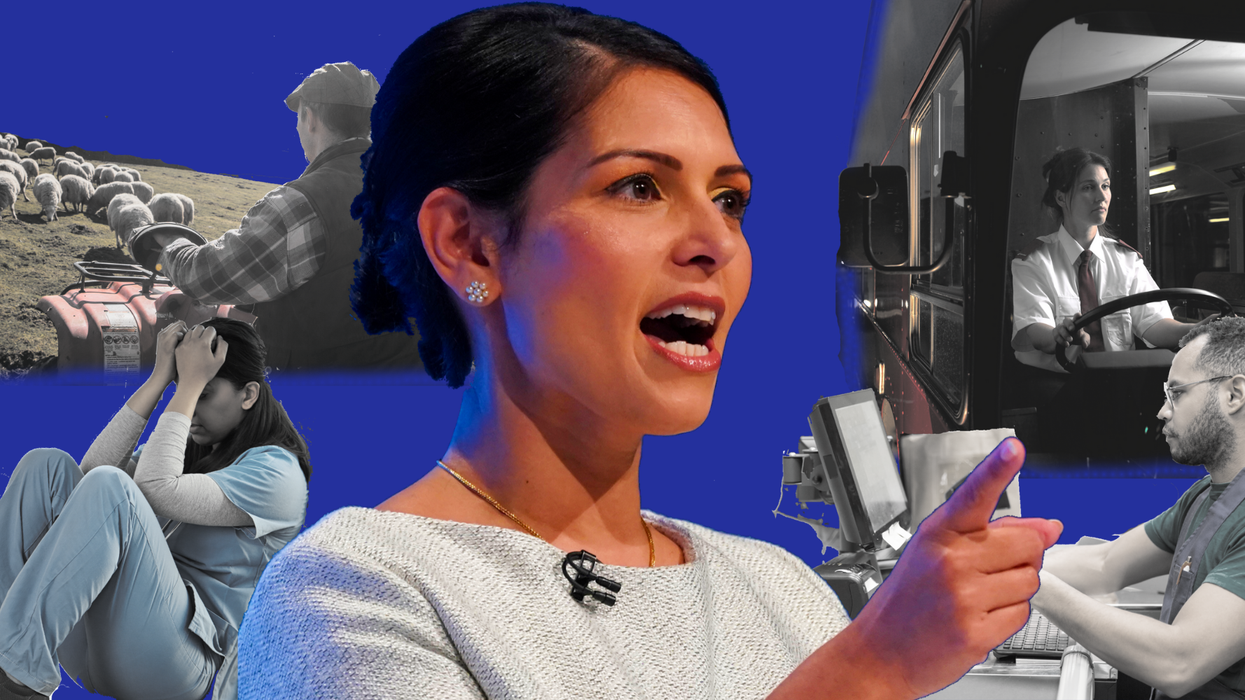News
Louis Staples
Mar 22, 2020

iStock/Getty/indy100
Following the government’s new measures to prevent the spread of coronavirus, pubs, restaurants, cafes and gyms have closed their doors.
With almost everyone working from home, it really feels like the country has ground to a halt, as the need to “flatten the curve” of new infections becomes even more urgent.
The only people who remain at work are those on the government’s newly published essential "key workers” list.
From health to the food industry, these workers are on the front lines to keep Britain working in these incredibly challenging times.
But many of these jobs weren’t considered valuable just a few weeks ago. Remember when home secretary Priti Patel unveiled those shiny new post-Brexit immigration controls in February?
Patel’s new guidelines were modelled on the “Australian points-based” system and unsurprisingly, it was awful. Under the proposed new rules, those earning under £25,000 per year were not be allowed entry to the UK unless the government deems there to be a shortage in the particular sector.
But others earning under the £25,000 benchmark were deemed “low-skilled” (this is how Patel described them during an interview with BBC Breakfast). She even admitted, in a later chat with LBC Radio, that her own parents – who migrated to the UK in the 1960s – would not have been able to move here under the new rules.
It turns out that many of the workers deemed “key” during the coronavirus pandemic were also deemed “low-skilled” just a few weeks ago.
“Low-waged” doesn’t equal “low skilled” at any time. But there’s a significant correlation between jobs on the Department of Education’s new list of essential “key” workers (whose children can still be educated because they’ll still have to work) and jobs that wouldn’t meet the government’s salary threshold according to February’s guidelines.
As Britain embraces this new way of life it’s important to remember that many of the “key” workers on the front lines were deemed too “low skilled” to be allowed into the UK to work just a few weeks ago.
Here’s a list of 10 “key” jobs that wouldn’t have made the cut…
Supermarket worker
Salary: £11,000 - £17,000
Coronavirus had made people behave completely irrationally in supermarkets, snapping up essential items with little regard for anyone else. It’s been very, very grim. But who is on the frontline of this daily battle? Supermarket workers, of course, who don’t even nearly achieve the minimum salary to be considered “skilled” by Priti Patel. If you ask us, keeping Britain fed in a time of national crisis, in hugely stressful conditions, is pretty skilled.
Banking customer service adviser
Salary: £15,000 - £24,000
During this stressful time, people might need advice with money or help sending cash across the world to loved ones who are feeling the pinch. That banking clerk who helps with these things in person on the phone is so valuable that they’ve made it on to the government’s list of “key” workers. But they’re also “unskilled”, according to the immigration guidelines proposed just a few weeks ago.
Midwife
Salary: £24, 212 (starting)
Coronavirus won’t stop people from having babies. And who do we need in this situation? Midwives, of course, which is why they’re very much on the “key” workers list. The midwife starting salary is just £24,000, and according to the government’s estimates this does rise, but who could actually think anyone who helps to deliver a baby is “unskilled” at any time? Let alone in a time of national crisis?
Bus or coach driver
Salary: £14,000 - £25,000
It’s very important for essential workers to get to work, which is why bus drivers are on the “key” workers list. The majority of them would also be “low skilled” salary-wise, though, according to the Home Office.
Carer
Salary: £12,500-£25,000
Salaries for social carers can start from about £16,000 per year but obviously that doesn’t mean it’s “low-skilled”. On the contrary, social care is a hugely demanding job that involves long hours at unsociable times, massive amounts of empathy and a real nurturing streak. The care sector also has a shortage of around 11,000 staff (that’s one in every 11 posts not filled) so it’s unsurprising they’ve made the government’s list of “key” workers during the Covid-19 oubreak.
Paramedic
Salary: £24,214 (starting)
Paramedics. You know them. The people who save lives, particularly in a situation where there’s a global virus that makes people struggle to breathe. They’re considered “essential” workers now, but the starting salary also makes them “low-skilled”, apparently.
Farm workers
Salary: £13,000 - £25,000
Less than 1 per cent of UK farm workers – that includes roles from fruit pickers to animal herders – are British nationals. Because Brits don’t want to work on farms, apparently. Or perhaps wages are just so low, they refused to. Either way, these people make our agricultural industry go round, even in this time of crisis, which makes them “key” workers. We think anyone who thinks this is “low-skilled” should spend a day outside on a farm, to be honest.
Nursery teacher
Starting salary: £18,000
Most nurseries, like schools, will be closed for the foreseeable future. But some will remain open to look after the children of the people on this list and other occupations which are deemed “essential”. But most of the teachers (especially young ones) in these nurseries? “Low-skilled”, apparently.
Social worker
Starting salary: £24,000
Children don’t stop being vulnerable because of a pandemic, which is why social workers are on the governments “essential” list. Sometimes the right interventions from a social worker can be life-changing, but this isn’t enough to make new social workers count as “high-skilled”, according to Patel’s logic.
Nurse
Starting salary: £24,000
Nurses are key workers at any time, but particularly during a pandemic. Patel’s guidelines do state that jobs where there’s a shortage of workers will have a reduced minimum salary threshold. Given there’s a shortage of nurses, it’s likely this job (like care workers) would qualify for that. But that still, it’s obviously ridiculous that, if there were not a national shortage of nurses, new nurses wouldn’t meet the salary threshold to be considered “high-skilled”. Particularly when nurses (both new and experienced) will be on the front lines of fighting coronavirus in the coming weeks.
As Britain continues to fight Covid-19, it's important to remember that we should value the people who do these jobs all the time, and compensate them accordingly. Because if the pandemic hadn't happened, many of the people who are keeping our country moving, often risking their own health and not seeing their families, would have been turned away if they'd tried to move to the UK from abroad.
Let's maybe re-think that?
Top 100
The Conversation (0)












